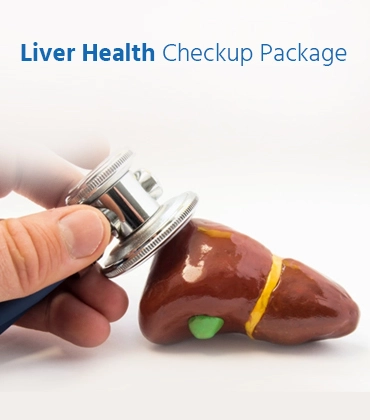Liver Health Checkup Package
List of Cancer Diseases That Can be Detected
- Serum Albumin
- Gamma GT
- USG Elastography of Liver
- Serum Bilirubin Total
- CBP (Complete Blood Picture)li>CUE (Complete Urine Examination)
- FBG (Fasting Blood Glucose)
- HBsAgQ2
- Serum Glutamic-Pyruvic Transaminase (SGPT)
- SGOT
- Total Proteins A/G Ratio
- Alkaline Phosphatase
Benefits of Liver Checkup Test
- Early Detection of Liver Diseases: A regular liver checkup test can detect liver diseases such as hepatitis, fatty liver disease and cirrhosis at an early stage, allowing for timely intervention and treatment.
- Examination of Liver Function: A liver checkup test provides valuable insights into the overall health and function of the liver by measuring levels of enzymes, proteins and other substances indicative of liver health.
- Monitoring Liver Health: For individuals with known liver conditions or risk factors such as alcohol abuse, obesity or viral hepatitis, regular checkups are important for monitoring the progression of the disease and estimating the effectiveness of treatment.
- Prevention of Complications: By detecting liver issues early on, checkup tests help control the development of complications such as liver failure, liver cancer and portal hypertension, which can be life-threatening if left untreated.
- Guidance for Lifestyle Changes: A result of a liver checkup test can guide individuals in making lifestyle changes such as adopting a healthier diet, exercising regularly, avoiding alcohol and certain medications and managing chronic conditions like diabetes and high cholesterol to maintain liver health.
- Evaluation of Medication Safety: Liver function tests are often performed before starting certain medications to assess liver health and determine if the medication is safe to use, as some drugs can cause liver damage or interact with existing liver conditions.
- Overall Health Assessment: Since the liver plays a crucial role in metabolism, detoxification and nutrient storage, a regular checkup test can provide valuable information about an individual's overall health status and specify potential underlying health issues beyond liver diseases.
Frequently Asked Questions
Certain foods and medications may affect the results of your liver function tests. Before your blood is drawn, your doctor will probably ask you to not eat and taking certain medications.
If you are between the ages of 30-50, you should have the tests done once a year. If you are over 60 years old, the frequency increases to once a year.
The liver helps your body maintain a healthy level of blood sugar. Your liver supplies glucose to your blood when it's needed. It eliminates pollutants from the bloodstream, controls blood clotting, and conducts hundreds of other essential tasks. It's in the right upper abdomen, beneath the rib cage.
Albumin is a protein made by your liver. Albumin keeps fluid in your bloodstream and prevents it from leaking into other tissues. The quantity of albumin in your blood is measured by a serum albumin test, which is a simple blood test. You're more likely to have a low albumin level if you've had surgery, been burnt, or have an open wound.
A fasting blood glucose test can be used to determine how effectively the body manages blood sugar levels while food is not present. When we do not eat for several hours, the body will release glucose into the blood via the liver and, following this, the body's insulin should help to stabilize blood glucose levels.
A complete urine examination helps in detecting such abnormal constituents in urine. Several disorders can be detected by identifying and measuring the levels of such substances. It may be used to screen for and/or help diagnose conditions such as urinary tract infections, kidney disorders, liver problems, diabetes, or other metabolic conditions.
A complete blood count (CBC) is a routine blood test used to assess your overall health. The blood test can help to diagnose a wide range of conditions, disorders, diseases, and infections, including Anemia (when there aren't enough red blood cells to carry oxygen through the body). Bone marrow disorders, such as myelodysplastic syndromes.



